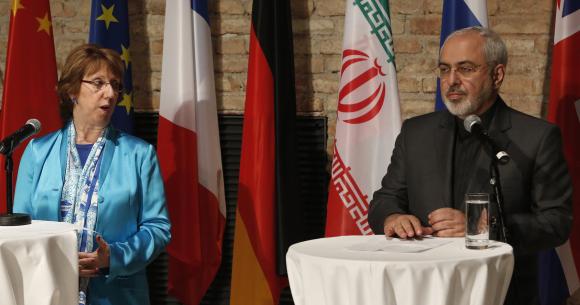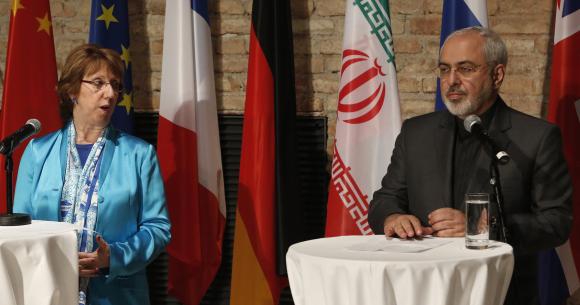 EU foreign policy chief Catherine Ashton (L) and Iranian Foreign Minister Mohammad Javad Zarif attend a news conference in Vienna July 18, 2014.
EU foreign policy chief Catherine Ashton (L) and Iranian Foreign Minister Mohammad Javad Zarif attend a news conference in Vienna July 18, 2014.CREDIT: REUTERS/LEONHARD FOEGER[/caption]
(Reuters) - Major powers appear to have made only limited headway in making sure Iran will not be able to build an atomic bomb any time soon, underlining the uphill task they face after talks that began in February were extended by four months.
Western officials say some progress was achieved during the most recent round of negotiations with Iran - enough to justify continuing the high-stakes diplomacy.
Crucially, they said they believe Iran's negotiators genuinely want to reach an agreement in order to win relief from sanctions that have severely damaged its oil-dependent�economy, rather than trying to gain more time for nuclear advances.
�"I am convinced that they are committed," a senior Western diplomat said, after Iran and the six world powers failed to meet a self-imposed July 20 deadline for a comprehensive accord and decided to prolong the talks until late November.
But it is unclear to what extent that is shared by Supreme Leader Ayatollah Ali Khamenei, who wants an end to sanctions but is seen as wary of a detente with the West.
On the most contentious issue in the decade-old standoff - Iran's capacity to make nuclear fuel that has military uses as well as the civilian ones Tehran argues for - positions remain far apart.
The United States,�France,�Germany,�Russia,�China�and Britain want Iran to scale back its nuclear program. Iran says it is entirely peaceful and wants sanctions lifted quickly.
"We still have a considerable way to go," a U.S. administration official said.
Iran's enrichment capacity goes to the heart of the dispute over its atomic ambitions as it determines the so-called breakout timeline - how long it would take to produce enough highly refined uranium for one nuclear weapon.
Iran says it is only enriching uranium to run atomic energy power plants.
In line with a breakout estimate voiced by U.S. Secretary of State John Kerry in April, Western experts say it may be as little as two months - a figure Washington is believed to want to see significantly stretched out, perhaps to a year.
There is a "vast divide" between the sides over the future size of Tehran's enrichment program, said Robert Einhorn, a former top U.S. official who was involved in policy on Iran.
BREAKOUT "MYTH"
Iran would also need to manufacture the actual weapon and then mount it on a ballistic missile for it to be an immediate risk. But acquiring bomb-grade uranium is seen as the most difficult and time-consuming challenge for any aspiring nuclear weapon state.
Some experts said the hypothetical breakout timeline for Iran - which dismisses as a "myth" such talk - is not likely to change much as a result of new action to limit its nuclear program that it agreed in Vienna to undertake in the next few months.
Under the terms of the extension of the negotiations, U.S. officials said Iran by late November would turn more of its most sensitive stockpile - uranium enriched to a fissile purity of 20 percent - from oxide into fuel for a research reactor in Tehran.
"It makes it much more difficult ... to use it to further enrich the highly enriched uranium that could be used for a nuclear weapon," one senior administration official said.
Iran will also dilute three tonnes of uranium refined to two percent - far below the 90 percent level required for bombs.
These measures are in addition to steps Iran already has implemented under an interim, six-month agreement reached in Geneva in November, especially the suspension of its most controversial enrichment, to a fissile purity of 20 percent.
That deal resulted in a "modest but worthwhile" lengthening of the time needed for any bomb bid, Einhorn said.
But Olli Heinonen, a former chief U.N. inspector, said Iran by the end of the new four-month period would still have some 7.5 tonnes of uranium refined to about 3.5 percent, the level used to fuel�nuclear power�plants. If enriched to weapons-grade, experts say, that stash could yield about five or six bombs.
With Iran's uranium�stocks�and number of centrifuges, "the technical breakout time - two months as Secretary Kerry has said earlier - does not change", Heinonen said in an email.
Centrifuges spin at supersonic speed to refine uranium.
U.S. expert David Albright welcomed the new steps but also said they had little impact on theoretical breakout scenarios.
INSPECTIONS MAY "DETER" BREAKOUT
Albright's Institute for Science and International Security in June said Iran could amass material for a nuclear bomb in three months or less, rejecting a finding by Iranian experts that cited a time frame six times longer.
Dismissing such Western estimates, Iranian Foreign Minister Mohammad Javad Zarif said that "small but powerful constituencies have irrationally advanced the idea that Iran can produce enough fissile material for a bomb in months."
After years of rising tension between the Islamic Republic and the West, last year's election of pragmatist Hassan Rouhani as Iran's president led to a thaw in ties that resulted in the current nuclear negotiations.
Iran says it would be willing to delay development of an industrial-scale uranium enrichment program for up to seven years and to keep the 19,000 centrifuges it has installed so far for this purpose. Washington says this is still too many.
"Until recently the U.S. was still pushing 1,500, though they always realized it was never a realistic number,� a source familiar with U.S. thinking said. Other diplomatic sources confirmed that Washington still wanted a centrifuge figure in the low thousands, a goal backed by the three European powers.
Some experts agree with Iran that there are other ways to ensure that the country does not produce nuclear weapons, including frequent access to its enrichment facilities by inspectors of the U.N. International Atomic Energy Agency.
"It is the number of inspections, not the number of centrifuges, that will deter any Iranian thought of a 'breakout' to bolt for a bomb," said Joseph Cirincione, head of the Ploughshares Fund, a U.S.-based security foundation.
By Reuters
The Iran Project is not responsible for the content of quoted articles.











